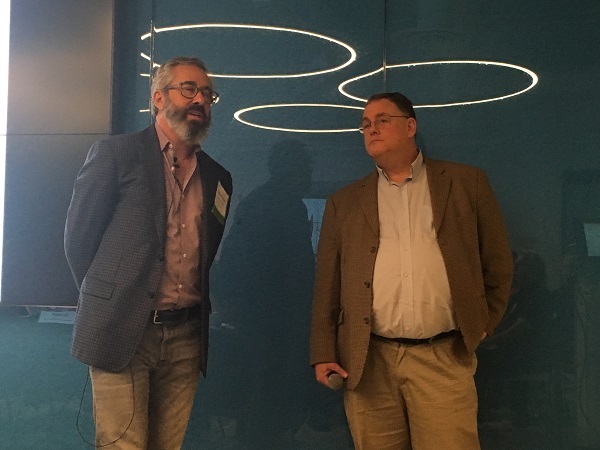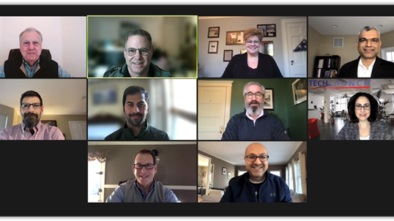Upper Montclair Startup Inkbench Beefs up Team, Makes Collaboration Product Free to Nonprofits for Six Months
What do you do when you are a startup CEO who was about to begin fundraising in March 2020? You take a deep breath and look at your options.
That was the position George Abraham, CEO of Inkbench (Upper Montclair), found himself in this year, as COVID-19 hit and significantly slowed down how the world was doing business. But Abraham and founder Steve Goodman aren’t sitting on their hands.
Like most startups, they’ve sharpened their pencils and are trying to be as smart as possible about their finances. They looked at their bottom line and understood that they still had enough funds to comfortably last them through the end of the year, Abraham told us.
Using the Time as an Opportunity
The duo decided to use this time as an opportunity to work on their product, which is a collaborative design platform. “We said, ‘Let’s make our product just great!’ We were already getting good, good feedback and a lot of interest, and our sales pipeline was getting fat. And we just said, ‘Let’s use this period of time, when people are not as focused on selling, and make an excellent platform, incorporating the feedback we’ve been getting from customers and prospects.’”
Also, the market downturn looked like a great time to pick up the talent they needed. They hired Doyel Ghosh, a senior full-stack developer from Bergen County who brings over 12 years of design and application programming experience to Inkbench. Ghosh is a Certified Scrum Master (CSM), and has joined the Inkbench development team as a senior software engineer. “She was doing some big-iron kinds of projects with NTT and the big financial institutions, and is a rock star,” said Abraham.
Also joining the team is one of the original designers of the Inkbench canvas, Santino Valenzuela. He worked with current lead developer Ed Maybert at The SPI Group (Fairfield), where the idea for the product was born as an inhouse collaboration tool. Valenzuela is a senior front-end developer, and Abraham said that he’s a modern wizard with user interfaces, and has over seven years of experience in building responsive websites.
Another hire came from one of the startup’s former customers, which was recently acquired. Stephanie Beighley, creative director, has been defining and developing brand experiences for both clients and agencies throughout her two-decade career. Abraham described Beighley as an Inkbench “power user” who will help subscribers with everything from implementation to design direction, as well as being actively involved in crafting the overall user experience.
There is also a paid student intern from Montclair State whom they onboarded in January, and who they hope will join the team when she graduates.
Supporting Nonprofits
Besides beefing up the startup’s capabilities, the executive team decided that this was the right time to offer the Inkbench product to nonprofit organizations. Abraham said that nonprofits are a good fit for the product, especially now that they’re working remotely, but still need to put out consistent messages to their donors and to the people they serve. The Inkbench platform is designed to keep marketing communications on brand, and it was built from the ground up for remote collaboration, he added.
“We want to support the people who are on the frontlines, keeping our society running, so we decided to give a free six-month subscription to our platform to any nonprofit who wants it.”
Inkbench is also providing tech support to the nonprofits, just as it does for enterprise consumers, with white-glove service. “In fact, I have two implementation calls today,” Abraham told us. Besides helping out nonprofits at this critical time, what does Inkbench get out of this? The company is learning a lot from these organizations, Abraham said, and everything that he and his colleagues learn will go into making the product even better.
The company is already working with several nonprofits to keep their social media and marketing campaigns on track, including a hospital system and an organization that helps immigrants establish restaurants.
What’s Next?
So, what’s next for Inkbench when the crisis is over? Prior to the coronavirus shutdown, the startup had considerable success in establishing its product in franchises, and Abraham noted that the company is completely devoted to supporting the franchise model. This model is especially well suited to Inkbench because the parent corporate partner can approve the marketing collateral, photos, logos and other assets, while franchisee can localize the content.
“You can have your remote teams taking templates that have been created, and reusing them. The people in charge can say, ‘Look, this element and that element of the templates are completely locked down. Nobody can change them. But you can change the verbiage or change pictures or whatever the people in charge choose to open up.’ And they can set rules, so that before social media posts or marketing materials are released, they are approved. Or they can impose other kinds of rules, or no rules at all.”
Abraham said that the Inkbench team has been calm during this crisis, and will continue to be productive. They’ll wait out the storm of COVID-19 until they can go back to selling and filling out their sales pipeline.




